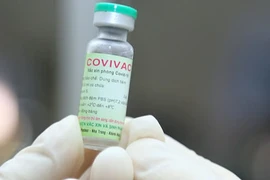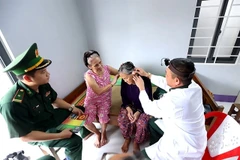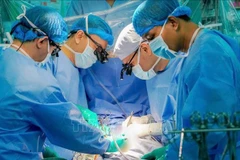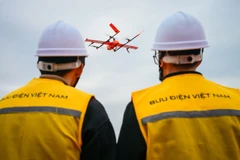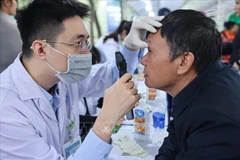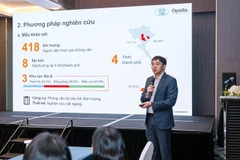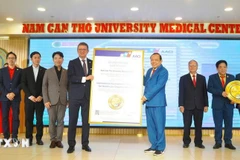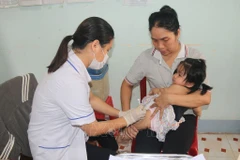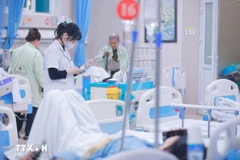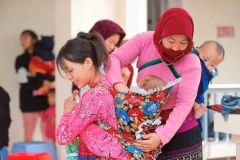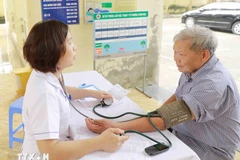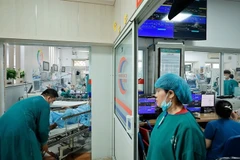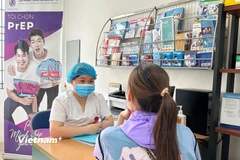 The Ministry of Health is considering approving Nano Covax COVID-19 vaccine for emergency use. (Photo: Nanogen)
The Ministry of Health is considering approving Nano Covax COVID-19 vaccine for emergency use. (Photo: Nanogen)Hanoi (VNA) – The Ministry of Health (MoH), in collaboration with the World Health Organisation (WHO), organised a webinar on August 4 to consult experts on the evaluation of clinical research data and emergency approval of COVID-19 vaccines.
This was the first meeting held by the two organisations to help Vietnam develop third-phase clinical test plan for its home-grown vaccines against the coronavirus. It also gathered experts from the Republic of Korea’s Ministry of Food and Drug Safety (MFDS) and others from Vietnam and foreign countries.
Speaking at the event, Deputy Health Minister Prof. Tran Van Thuan emphasised the critical role vaccine is playing in fighting the pandemic, saying there are two homegrown vaccine candidates in Vietnam – Covivac and Nano Covax – which are now in the second and third phases of clinical trials, respectively.
Vietnam is considering approving Nano Covax for emergency use, but lacks experience in this matter, he said.
So, the country wishes to learn from experience from WHO and the MFDS and other experts in vaccine development and clinical trials as well as emergency approval, Thuan added.
Nguyen Ngo Quang, deputy head of the MoH’s Department of Science, Technology and Training, said developed by the Nanogen Pharmaceutical Biotechnology JSC, Nano Covax is going through the third phase of clinical trials on volunteers aged 18 and above to assess its safety, immunogenicity and efficacy.
Nano Covax’s Phase 3a clinical trials involve 1,000 volunteers while the vaccine will be tested on more than 12,000 volunteers in Phase 3b, he said, adding that Nanogen will release final results of Phase 2 on August 7 and those of Phase 3a before August 15.
Competent authorities will review these results to obtain initial data on the immunogenicity and efficacy of the vaccine candidate in Phase 3a, he highlighted.
The official went on to say that developers of Covivac are evaluating its immunogenicity in the first phase of the human trials to prepare for Phase 2, the results of which are expected to be released sometime between the end of the third and fourth quarters of this year.
Covivac is developed by the MoH’s Institute of Vaccines and Medical Biologicals (IVAC).
Regarding the transfer of vaccine production technology, Quang said that the ministry has approved the clinical trial plan for the ARCT-154 COVID-19 vaccine. The vaccine is manufactured using the mRNA technology purchased by a Vietnamese corporation from the US The research team plans to launch the clinical trial programme of this vaccine candidate on August 8.
Vietnam has also signed two agreements with partners from Russia and Japan on the transfer of COVID-19 vaccine technologies.
A representative from WHO said a total of 17 COVID-19 vaccines have been administered worldwide, seven of which received WHO’s approval for emergency use. The organisation recommended that Vietnam must develop guidelines for licensing the circulation and emergency use of home-grown and imported vaccines.
WHO also suggested Vietnam continue consulting both local and foreign experts to speed up the emergency approval of vaccine candidates to minimise associated risks.
Kidong Park, WHO Representative in Vietnam, affirmed that after this first meeting, WHO and the MoH will hold more meetings in order to assist Vietnam in improving its capacity of developing COVID-19 vaccines, accelerate the formulation of regulations guiding the approval of vaccines, and expand the use vaccines in the country. It is expected to help Vietnam secure a sufficient supply of COVID-19 vaccines for its people as soon as possible and hopefully for export, he said.
Nano Covax is the most promising candidate among four domestic vaccines being developed by Vietnam. If approved, commercial production could start soon.
The price for each dose was projected to be 120,000 VND (5.2 USD). The doses are given intramuscularly with the spacing between each dose about a month, according to Nanogen.
The other vaccines are being developed by the Institute of Vaccines and Medical Biologicals, the Vaccine and Biological Production Company No. 1, and the Center for Research and Production of Vaccines and Biologicals.
The Government is making efforts to secure at least 150 million vaccine doses to cover 70 percent of the population./.



